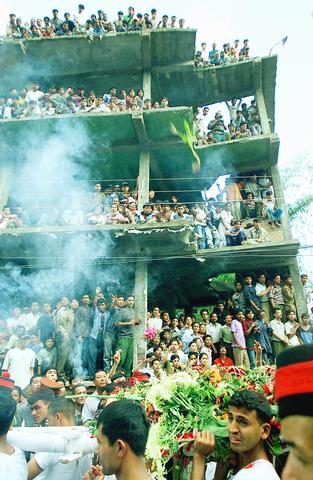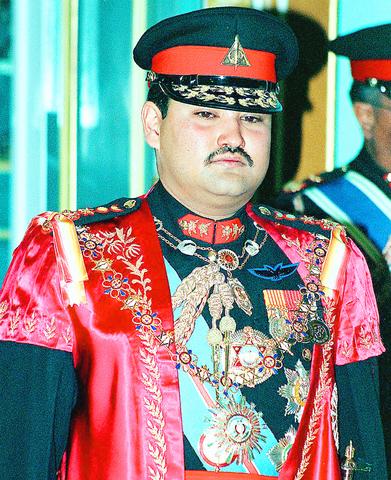Nepal's Crown Prince Dipendra, who killed his parents and six other members of his royal family and then turned the gun on himself, has been declared King and remained on life support yesterday, according to government officials.
The government State Council, which oversees royal affairs in Nepal, named Prince Dipendra as king after King Birendra, the queen and six others were slain and three others were injured.

PHOTO: REUTERS
As Prince Dipendra was declared clinically dead and remained on a respirator at an army hospital yesterday, the State Council named his uncle, Prince Gyanendra, as acting king, or ``regent.''

PHOTO: AFP
``Since the king passed away, the Council declared Crown Prince Dipendra as the King of Nepal. But since the Crown Prince is in the hospital and is mentally and physically unsuitable to carry out his duties, the State Council appoints Prince Gyanendra as assistant to the crown,'' said a statement by the council.
Crown Prince Dipendra, 29, shot all immediate members of the royal family late Friday night, including King Birendra, 55, Queen Aiswarya, 51, his brother and sister, Prince Nirajan, 22, and Princess Shruti, 24, who had two daughters.
The State Council confirmed that the others killed were Princess Sharada Shah and Princess Shanti Singh, both sisters of the king; Kumar Khadga Bikram Shah, Princess Sharada's husband; and Princess Jayanti Shah, a cousin to the late king.
The Council said that three others were injured: Gorakh Bikram, Princess Shruti's husband; Komal Shah, the king's cousin; and Prince Dhirendra, the king's youngest brother.
They remained at the military hospital, where they were in stable condition.
The bodies of the dead were to be taken in a procession from the army hospital late yesterday and cremated according to Hindu rites near a temple on the banks of the Bagmat River. In Nepal, Hindus must be buried within 24 hours of their passing.
The government declared a five-day mourning period and ordered flags at half-staff. No foreign dignitaries or diplomats were invited to the last rites at the Pashupatinath temple.
The decision of whether to remove the crown prince from life support could fall to his uncle, now the acting king, or his only other close relative, the slain-king's 73-year-old stepmother Ratna Rajya Laxmi Devi Shah, known as the Queen Mother in Nepal.
Deputy Prime Minister Ram Chandra Paudel called the family massacre ``a national tragedy,'' and ruled out any involvement of Maoist rebels seeking to overthrow the monarchy.
``This is the most unfortunate and shocking event,'' he said.
Prince Gyanendra, a conservationist, arrived in the capital by car yesterday afternoon from the jungle area of Chitwan.
The slaughter at the Narayanhiti Royal Palace is believed to have been the worst mass murder of royals since the Romanovs were slain on the order of Vladimir Lenin in 1918 during the Russian civil war.
The military official said the shooting was caused by a dispute over the marriage of the prince because his mother, the queen, reportedly objected to his choice of bride.
The royal family had gathered Friday night for dinner to discuss the wedding of Prince Dipendra. Sources close to the family said that the prince wished to marry the daughter of a former government minister who is a member of the aristocratic Rana family, which ruled Nepal until 1951.
The crown prince, educated at Britain's Eton College, was heir to the throne.
The incident occurred around 10:40pm local time Friday.
Katmandu, the capital of 1.5 million, woke up yesterday to the news of the slayings. Thousands of people flocked to the royal palace in the heart of the city.
``This is unbelievable ... one day you hear that the crown prince is getting married soon and the next day he goes on to a shooting rampage and kills everyone in the family,'' said Shreeram Shrestha, who had rushed to the palace after hearing the news.
The government made no formal announcement about the deaths or new acting king until yesterday afternoon. This angered some supporters of the royal family who gathered at the palace to shout anti-government slogans.
The royal family is revered in Nepal. Some believe that the king is the reincarnation of the Hindu god, Vishnu.
The royal couple were married in February 1970. Their first child, Dipendra, was born on June 27, 1971. King Birendra was crowned to the throne on Jan. 31, 1972.
Of the nearly 22 million population in Nepal, about 90 percent are Hindu and 5 percent Buddhist. Home to the world's tallest peak, Mount Everest, Nepal is one of the world's poorest countries, with a per capita income of only US$213.
The incident comes at a time when the Himalayan state is going through major political instability. Opposition parties have been demanding Prime Minister Girija Prasad Koirala's resignation for the government's alleged role in a bribery scandal and for not quelling a growing Maoist insurgency.

The Ministry of the Interior (MOI) is to tighten rules for candidates running for public office, requiring them to declare that they do not hold a Chinese household registration or passport, and that they possess no other foreign citizenship. The requirement was set out in a draft amendment to the Enforcement Rules of the Public Officials Election and Recall Act (公職人員選舉罷免法 ) released by the ministry on Thursday. Under the proposal, candidates would need to make the declaration when submitting their registration forms, which would be published in the official election bulletin. The move follows the removal of several elected officials who were

The Republic of China (ROC) is celebrating its 114th Double Ten National Day today, featuring military parades and a variety of performances and speeches in front of the Presidential Office in Taipei. The Taiwan Taiko Association opened the celebrations with a 100-drummer performance, including young percussionists. As per tradition, an air force Mirage 2000 fighter jet flew over the Presidential Office as a part of the performance. The Honor Guards of the ROC and its marching band also heralded in a military parade. Students from Taichung's Shin Min High School then followed with a colorful performance using floral imagery to represent Taiwan's alternate name

FOUR DESIGNATED AREAS: Notices were issued for live-fire exercises in waters south and northwest of Penghu, northeast of Keelung and west of Kaohsiung, they said The military is planning three major annual exercises across the army, navy and air force this month, with the navy’s “Hai Chiang” (海強, “Sea Strong”) drills running from today through Thursday, the Ministry of National Defense said yesterday. The Hai Chiang exercise, which is to take place in waters surrounding Taiwan, would feature P-3C Orion maritime patrol aircraft and S-70C anti-submarine helicopters, the ministry said, adding that the drills aim to bolster the nation’s offshore defensive capabilities. China has intensified military and psychological pressure against Taiwan, repeatedly sending warplanes and vessels into areas near the nation’s air defense identification zone and across

A Chinese takeover of Taiwan would severely threaten the national security of the US, Japan, the Philippines and other nations, while global economic losses could reach US$10 trillion, National Security Council Deputy Secretary-General Lin Fei-fan (林飛帆) wrote in an article published yesterday in Foreign Affairs. “The future of Taiwan is not merely a regional concern; it is a test of whether the international order can withstand the pressure of authoritarian expansionism,” Lin wrote in the article titled “Taiwan’s Plan for Peace Through Strength — How Investments in Resilience Can Deter Beijing.” Chinese President Xi Jinping’s (習近平) intent to take Taiwan by force